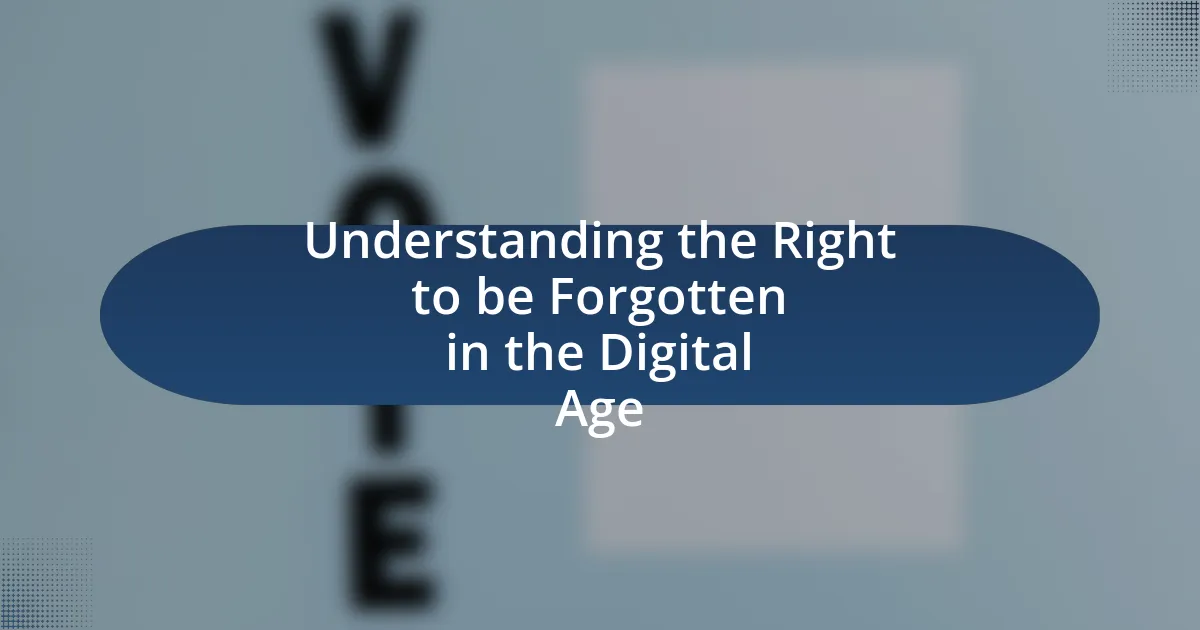The article examines the evolving landscape of privacy regulations on a global scale, highlighting key trends such as the rise of comprehensive data protection laws, increased enforcement, and a focus on individual rights. It discusses the impact of technological advancements, particularly artificial intelligence, on privacy regulations and the challenges posed by emerging technologies. The article also addresses the implications of global data flows, cross-border data transfer regulations, and the difficulties countries face in harmonizing privacy laws. Additionally, it outlines major privacy regulations like the GDPR and CCPA, and emphasizes the importance of public awareness and consumer attitudes in shaping regulatory changes. Finally, the article provides insights into best practices for businesses to navigate the complex regulatory environment effectively.

What are the key trends shaping the future of privacy regulations globally?
Key trends shaping the future of privacy regulations globally include the rise of comprehensive data protection laws, increased enforcement of existing regulations, and a growing emphasis on individual rights. Comprehensive laws, such as the General Data Protection Regulation (GDPR) in Europe, have set a precedent for other regions, prompting countries like Brazil and India to develop similar frameworks. Increased enforcement is evident as regulatory bodies impose significant fines for non-compliance, with GDPR fines reaching over €1 billion in 2021 alone. Additionally, there is a heightened focus on individual rights, with regulations increasingly granting consumers greater control over their personal data, reflecting a global shift towards prioritizing privacy in the digital age.
How are technological advancements influencing privacy regulations?
Technological advancements are significantly influencing privacy regulations by necessitating more robust frameworks to protect personal data. As technologies such as artificial intelligence, big data analytics, and the Internet of Things evolve, they create new challenges for data privacy, prompting regulators to adapt existing laws or create new ones. For instance, the General Data Protection Regulation (GDPR) in the European Union was enacted in response to the growing capabilities of data processing technologies, establishing strict guidelines for data collection and user consent. This regulatory shift reflects the need for legal frameworks to keep pace with rapid technological changes, ensuring that individuals’ privacy rights are safeguarded in an increasingly digital world.
What role does artificial intelligence play in privacy regulation changes?
Artificial intelligence significantly influences privacy regulation changes by enabling more effective data processing and compliance monitoring. AI technologies, such as machine learning algorithms, can analyze vast amounts of data to identify patterns and anomalies, assisting organizations in adhering to privacy laws like the General Data Protection Regulation (GDPR). For instance, AI can automate the process of data subject requests, ensuring timely responses and reducing the risk of non-compliance. Furthermore, AI-driven tools can enhance risk assessments by predicting potential data breaches, thereby prompting regulatory updates to address emerging threats. This dynamic interaction between AI capabilities and regulatory frameworks illustrates the necessity for continuous adaptation in privacy regulations to keep pace with technological advancements.
How do emerging technologies challenge existing privacy frameworks?
Emerging technologies challenge existing privacy frameworks by introducing new methods of data collection, processing, and sharing that often outpace regulatory measures. For instance, advancements in artificial intelligence and machine learning enable the analysis of vast amounts of personal data in real-time, which can lead to privacy violations if not properly regulated. A study by the European Union Agency for Fundamental Rights highlights that technologies like facial recognition and the Internet of Things can collect sensitive information without user consent, undermining traditional privacy protections established by laws such as the General Data Protection Regulation (GDPR). This gap between technological capabilities and regulatory frameworks creates significant risks for individual privacy and necessitates urgent updates to existing laws to address these challenges effectively.
What are the implications of global data flows on privacy regulations?
Global data flows significantly challenge existing privacy regulations by creating jurisdictional conflicts and complicating compliance. As data crosses borders, differing national laws, such as the European Union’s General Data Protection Regulation (GDPR) and the United States’ sectoral approach, lead to inconsistencies in data protection standards. This divergence can result in legal ambiguities for multinational companies, which must navigate varying requirements and face potential penalties for non-compliance. Furthermore, the rise of data localization laws in some countries, which mandate that data be stored within national borders, adds another layer of complexity, potentially hindering the free flow of information essential for global business operations.
How do cross-border data transfer regulations affect businesses?
Cross-border data transfer regulations significantly impact businesses by imposing legal requirements on how data can be shared internationally. These regulations, such as the General Data Protection Regulation (GDPR) in Europe, require businesses to ensure that data transferred outside their jurisdiction is adequately protected, often necessitating additional compliance measures. For instance, companies may need to implement Standard Contractual Clauses (SCCs) or rely on adequacy decisions to facilitate lawful data transfers. Failure to comply can result in substantial fines; under GDPR, penalties can reach up to 4% of a company’s global annual revenue. Thus, businesses must invest in legal and technical resources to navigate these complex regulations, affecting operational costs and strategic planning.
What challenges do countries face in harmonizing privacy laws?
Countries face significant challenges in harmonizing privacy laws due to differing legal frameworks, cultural attitudes towards privacy, and varying levels of economic development. These differences create obstacles in establishing a unified approach to data protection. For instance, the European Union’s General Data Protection Regulation (GDPR) emphasizes strict consent and data protection rights, while other regions may prioritize economic growth over stringent privacy measures. Additionally, the lack of international agreements and varying enforcement mechanisms complicate cross-border data transfers, leading to inconsistencies in compliance. These factors collectively hinder the ability to create cohesive privacy regulations that can be uniformly applied across nations.
Why is public awareness of privacy issues increasing?
Public awareness of privacy issues is increasing due to heightened concerns over data breaches and misuse of personal information. High-profile incidents, such as the Facebook-Cambridge Analytica scandal, have exposed vulnerabilities in data protection and raised public consciousness about how personal data is collected and used. According to a 2021 survey by the Pew Research Center, 79% of Americans expressed concern about how their data is being used by companies, indicating a significant shift in public sentiment towards privacy. This growing awareness is further fueled by the implementation of stricter privacy regulations, such as the General Data Protection Regulation (GDPR) in Europe, which has set a precedent for data protection globally.
What factors contribute to the growing demand for privacy protection?
The growing demand for privacy protection is primarily driven by increasing public awareness of data breaches and misuse of personal information. High-profile incidents, such as the Facebook-Cambridge Analytica scandal, have highlighted vulnerabilities in data security, leading consumers to seek stronger privacy measures. Additionally, the rise of digital surveillance technologies and the proliferation of personal data collection by companies have intensified concerns about individual privacy rights. According to a 2021 survey by the Pew Research Center, 79% of Americans expressed concern about how their data is being used by companies, underscoring the urgency for enhanced privacy protections.
How do consumer attitudes towards privacy shape regulatory changes?
Consumer attitudes towards privacy significantly influence regulatory changes by prompting lawmakers to respond to public demand for stronger data protection measures. As consumers increasingly express concerns about data breaches and misuse of personal information, governments are compelled to enact regulations that address these issues. For instance, the introduction of the General Data Protection Regulation (GDPR) in the European Union was largely driven by heightened consumer awareness and demand for privacy rights, reflecting a shift in societal expectations regarding data handling. This regulatory framework has since inspired similar legislation worldwide, demonstrating how consumer sentiment can catalyze comprehensive legal reforms aimed at enhancing privacy protections.

What are the major privacy regulations currently in place worldwide?
The major privacy regulations currently in place worldwide include the General Data Protection Regulation (GDPR) in the European Union, the California Consumer Privacy Act (CCPA) in the United States, and the Personal Information Protection and Electronic Documents Act (PIPEDA) in Canada. The GDPR, effective since May 2018, sets stringent guidelines for data protection and privacy for individuals within the EU and the European Economic Area, imposing heavy fines for non-compliance. The CCPA, enacted in January 2020, grants California residents rights regarding their personal information, including the right to know what data is collected and the right to delete it. PIPEDA, which came into force in 2000, governs how private sector organizations collect, use, and disclose personal information in the course of commercial activities in Canada. These regulations reflect a growing global emphasis on data privacy and protection.
How do the GDPR and CCPA compare in their approaches to privacy?
The General Data Protection Regulation (GDPR) and the California Consumer Privacy Act (CCPA) both aim to enhance consumer privacy but differ significantly in their scope and enforcement mechanisms. GDPR applies to all organizations processing personal data of EU residents, emphasizing data protection by design and default, while CCPA focuses on California residents and grants them rights such as the ability to opt-out of data selling. GDPR imposes stricter penalties for non-compliance, with fines reaching up to 4% of global revenue, whereas CCPA fines are capped at $7,500 per violation. Additionally, GDPR requires explicit consent for data processing, while CCPA allows for implied consent under certain conditions. These differences highlight the GDPR’s broader and more stringent approach compared to the CCPA’s more flexible framework.
What are the key provisions of the GDPR that impact global privacy standards?
The key provisions of the GDPR that impact global privacy standards include data subject rights, data protection by design and by default, and stringent consent requirements. Data subject rights empower individuals with control over their personal data, including rights to access, rectification, erasure, and data portability, which set a benchmark for privacy rights worldwide. Data protection by design and by default mandates that organizations integrate data protection measures into their processing activities from the outset, influencing global practices in data handling. Additionally, the GDPR’s requirement for explicit consent for data processing has prompted many countries to adopt similar standards, reinforcing the importance of user consent in privacy regulations. These provisions collectively shape a more rigorous global framework for data protection, encouraging countries to enhance their privacy laws in alignment with GDPR principles.
How does the CCPA enhance consumer rights in California?
The California Consumer Privacy Act (CCPA) enhances consumer rights in California by granting individuals greater control over their personal information held by businesses. Specifically, the CCPA allows consumers to know what personal data is being collected, the purpose of its collection, and the ability to access, delete, and opt-out of the sale of their personal information. This legislation applies to businesses that meet certain revenue thresholds or handle large volumes of personal data, thereby ensuring that a significant number of consumers benefit from these rights. The CCPA represents a significant shift towards consumer empowerment in data privacy, reflecting a growing demand for transparency and accountability in how personal information is managed.
What emerging privacy regulations should businesses be aware of?
Businesses should be aware of several emerging privacy regulations, including the European Union’s Digital Services Act (DSA) and the General Data Protection Regulation (GDPR) updates, as well as the California Privacy Rights Act (CPRA) and the Virginia Consumer Data Protection Act (VCDPA). The DSA aims to create a safer digital space by imposing stricter rules on online platforms regarding user data and content moderation. GDPR updates focus on enhancing user consent and data protection measures. The CPRA expands consumer rights regarding personal data in California, while the VCDPA establishes new data protection rights for Virginia residents. These regulations reflect a global trend towards increased accountability and transparency in data handling practices.
How are countries like Brazil and India developing their privacy laws?
Brazil and India are developing their privacy laws through comprehensive legislative frameworks aimed at protecting personal data. Brazil enacted the General Data Protection Law (LGPD) in 2018, which establishes guidelines for data processing and grants individuals rights over their personal information, similar to the European Union’s GDPR. India is in the process of finalizing its Personal Data Protection Bill, which seeks to regulate the processing of personal data and enhance user consent mechanisms. Both countries are influenced by global standards and are working to align their regulations with international best practices to ensure data protection and privacy for their citizens.
What lessons can be learned from the implementation of privacy regulations in different regions?
The implementation of privacy regulations in different regions reveals several key lessons, primarily the importance of adaptability, enforcement mechanisms, and public awareness. For instance, the General Data Protection Regulation (GDPR) in the European Union has demonstrated that comprehensive regulations can enhance consumer trust and data protection, leading to a significant increase in compliance costs for businesses but also fostering a culture of accountability. In contrast, the California Consumer Privacy Act (CCPA) highlights the necessity of clear definitions and consumer rights, as it has empowered individuals to understand and control their personal data. Furthermore, regions that have prioritized public education about privacy rights, such as Canada with its Personal Information Protection and Electronic Documents Act (PIPEDA), have seen higher levels of compliance and engagement from both consumers and businesses. These examples underscore that effective privacy regulations must be flexible enough to evolve with technological advancements while ensuring robust enforcement and fostering an informed public.
What role do international organizations play in shaping privacy regulations?
International organizations play a crucial role in shaping privacy regulations by establishing frameworks and guidelines that influence national laws. For instance, the European Union’s General Data Protection Regulation (GDPR) has set a global standard for data protection, prompting countries worldwide to adopt similar regulations. Additionally, organizations like the United Nations and the Organisation for Economic Co-operation and Development (OECD) promote international cooperation and best practices in privacy, facilitating dialogue among member states to harmonize their approaches to data protection. This influence is evident as many nations reference these international standards when developing their own privacy laws, demonstrating the significant impact of international organizations on global privacy regulation.
How does the United Nations influence global privacy standards?
The United Nations influences global privacy standards primarily through its advocacy for human rights, including the right to privacy, as articulated in the Universal Declaration of Human Rights. The UN promotes international frameworks and guidelines, such as the International Covenant on Civil and Political Rights, which emphasizes the importance of privacy protection. Additionally, the UN’s Human Rights Council and various special rapporteurs address privacy issues, providing recommendations and reports that shape national policies and encourage countries to adopt comprehensive privacy laws. These efforts contribute to a global dialogue on privacy standards, fostering cooperation among member states to enhance privacy protections worldwide.
What initiatives are being taken by the OECD regarding privacy protection?
The OECD is actively promoting privacy protection through several key initiatives, including the development of the OECD Privacy Guidelines, which provide a framework for member countries to enhance their privacy laws and practices. These guidelines emphasize principles such as accountability, transparency, and individual participation, aiming to foster trust in the digital economy. Additionally, the OECD conducts regular reviews and updates of these guidelines to adapt to emerging technologies and privacy challenges, ensuring that they remain relevant and effective. The organization also engages in international cooperation and dialogue to share best practices and harmonize privacy regulations across borders, thereby strengthening global privacy protection efforts.

How can businesses prepare for the evolving landscape of privacy regulations?
Businesses can prepare for the evolving landscape of privacy regulations by implementing comprehensive data governance frameworks. These frameworks should include regular audits of data practices, employee training on compliance, and the establishment of clear data handling policies. For instance, the General Data Protection Regulation (GDPR) has set a precedent for stringent data protection laws, compelling organizations to adopt proactive measures to avoid hefty fines. According to a report by the International Association of Privacy Professionals, companies that invest in privacy compliance can reduce the risk of data breaches by up to 50%. By staying informed about emerging regulations and adapting their practices accordingly, businesses can ensure compliance and build consumer trust.
What best practices should organizations adopt to ensure compliance?
Organizations should adopt a comprehensive compliance framework that includes regular risk assessments, employee training, and robust data management policies. Regular risk assessments help identify vulnerabilities and ensure that organizations are aware of their compliance obligations under various privacy regulations, such as the GDPR and CCPA. Employee training is crucial, as it equips staff with the knowledge to handle personal data responsibly and understand the implications of non-compliance. Additionally, implementing robust data management policies ensures that data is collected, stored, and processed in accordance with legal requirements, thereby minimizing the risk of breaches and penalties. These practices are supported by findings from the International Association of Privacy Professionals, which emphasize that organizations with structured compliance programs are better positioned to navigate complex regulatory landscapes.
How can businesses conduct effective privacy impact assessments?
Businesses can conduct effective privacy impact assessments by systematically identifying and evaluating the potential privacy risks associated with their data processing activities. This process involves several key steps: first, businesses should define the scope of the assessment, including the data types and processing purposes; second, they must identify stakeholders and involve them in the assessment process to gather diverse perspectives; third, businesses should analyze the potential impacts on individuals’ privacy and assess the likelihood and severity of those impacts; fourth, they need to implement measures to mitigate identified risks, ensuring compliance with relevant privacy regulations such as the GDPR or CCPA; finally, businesses should document the assessment process and outcomes, maintaining transparency and accountability. This structured approach is supported by the fact that organizations that regularly conduct privacy impact assessments are better equipped to manage compliance risks and protect consumer trust.
What role does employee training play in maintaining compliance?
Employee training plays a critical role in maintaining compliance by ensuring that employees understand and adhere to relevant laws and regulations. Effective training programs equip staff with the knowledge of compliance requirements, such as data protection laws, which are essential in the context of evolving privacy regulations globally. For instance, organizations that implement regular compliance training can reduce the risk of violations; a study by the Ponemon Institute found that companies with comprehensive training programs experience 50% fewer data breaches. This demonstrates that well-informed employees are less likely to engage in practices that could lead to non-compliance, thereby safeguarding the organization against legal penalties and reputational damage.
What tools and technologies can assist in managing privacy regulations?
Tools and technologies that assist in managing privacy regulations include data protection management software, compliance automation tools, and privacy impact assessment tools. Data protection management software, such as OneTrust and TrustArc, helps organizations track and manage personal data, ensuring compliance with regulations like GDPR and CCPA. Compliance automation tools, like LogicGate and RSA Archer, streamline the process of monitoring regulatory changes and maintaining compliance documentation. Privacy impact assessment tools, such as Privacera and Nymity, facilitate the evaluation of data processing activities to identify and mitigate privacy risks. These tools are essential for organizations to navigate the complex landscape of privacy regulations effectively.
How can data protection management software enhance compliance efforts?
Data protection management software enhances compliance efforts by automating the tracking and reporting of data handling practices. This software ensures organizations adhere to regulations such as GDPR and CCPA by providing tools for data mapping, risk assessments, and incident response management. For instance, a study by the International Association of Privacy Professionals found that organizations using such software reported a 30% reduction in compliance-related incidents. By streamlining processes and maintaining accurate records, data protection management software significantly reduces the risk of non-compliance and associated penalties.
What are the benefits of using privacy by design principles in product development?
The benefits of using privacy by design principles in product development include enhanced user trust, reduced risk of data breaches, and compliance with privacy regulations. By integrating privacy into the design process from the outset, companies can create products that prioritize user data protection, which fosters trust and loyalty among consumers. Research indicates that organizations implementing privacy by design experience fewer data breaches, as proactive measures are taken to safeguard personal information. Furthermore, aligning product development with privacy regulations, such as the General Data Protection Regulation (GDPR), helps avoid costly fines and legal issues, ensuring that businesses operate within the legal framework while maintaining a competitive edge.
What strategies can organizations implement to stay ahead of regulatory changes?
Organizations can implement proactive compliance strategies to stay ahead of regulatory changes. These strategies include establishing a dedicated compliance team to monitor regulatory developments, investing in compliance technology for real-time updates, and conducting regular training sessions for employees on compliance requirements. For instance, a study by Deloitte found that organizations with dedicated compliance teams are 30% more likely to adapt quickly to regulatory changes. Additionally, engaging with industry associations can provide insights into upcoming regulations, allowing organizations to prepare in advance.
How can businesses engage with policymakers to influence privacy regulations?
Businesses can engage with policymakers to influence privacy regulations by actively participating in public consultations and providing expert insights on the implications of proposed laws. This engagement can include submitting position papers, attending hearings, and collaborating with industry associations to present a unified stance. For instance, the Business Roundtable has effectively influenced regulatory discussions by advocating for balanced privacy frameworks that protect consumer rights while allowing for innovation. Such proactive involvement not only informs policymakers but also demonstrates the business community’s commitment to responsible data practices, ultimately shaping regulations that reflect both consumer protection and economic growth.
What resources are available for organizations to keep updated on privacy laws?
Organizations can utilize several resources to stay updated on privacy laws, including government websites, legal databases, and industry associations. Government websites, such as the Federal Trade Commission (FTC) in the United States or the European Data Protection Board (EDPB) in the EU, provide official updates and guidelines on privacy regulations. Legal databases like Westlaw and LexisNexis offer comprehensive access to legal texts, case law, and regulatory changes. Additionally, industry associations such as the International Association of Privacy Professionals (IAPP) and the Privacy Rights Clearinghouse provide newsletters, webinars, and training sessions focused on current privacy law developments. These resources ensure organizations remain compliant and informed about evolving privacy regulations globally.





